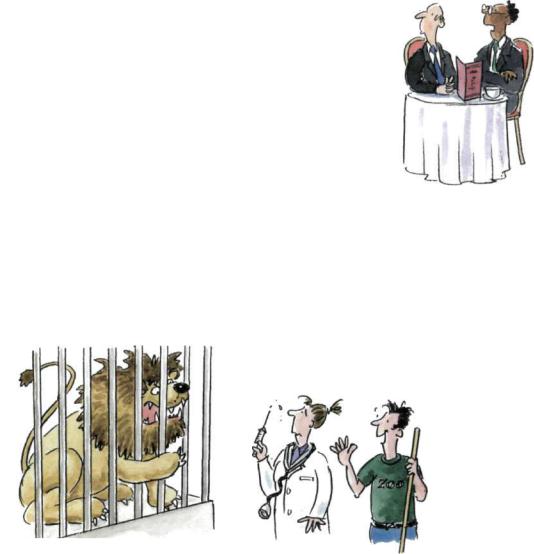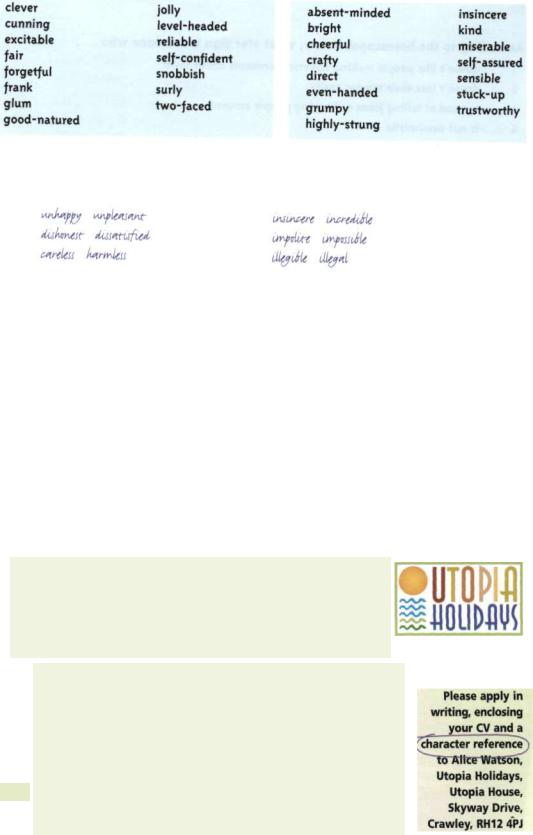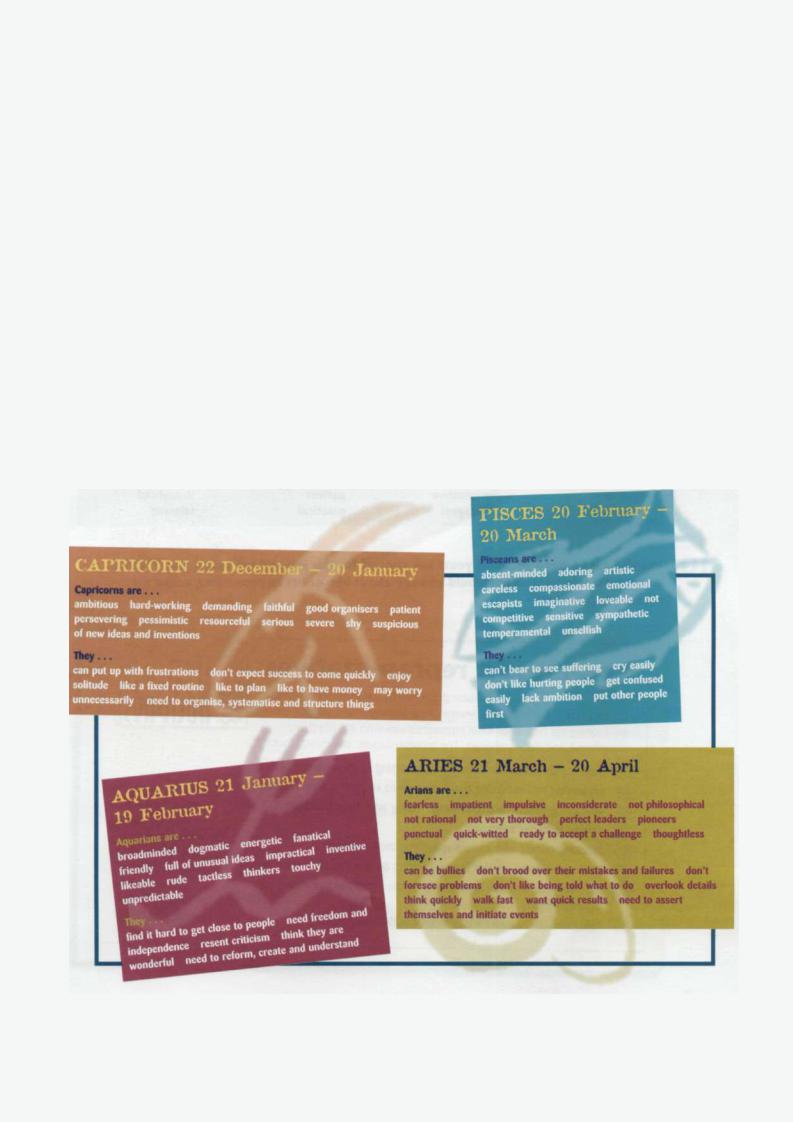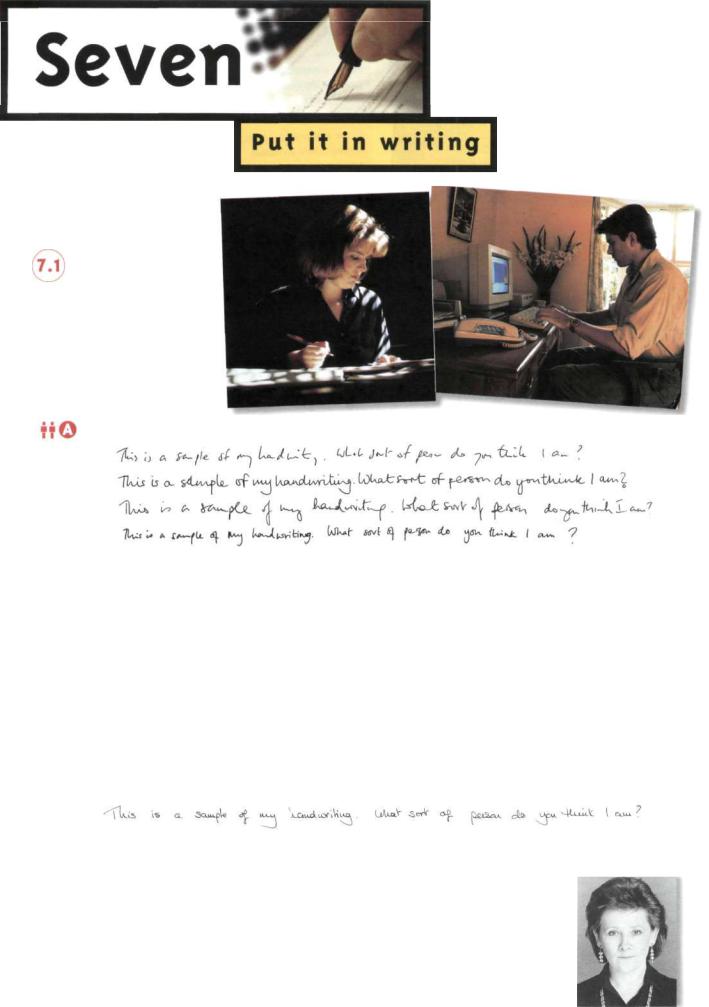
English_books / Adv_eng
.pdf
2One of you should look at Activity 12, the other at 32 . You'll find out the rest of the story.
Read this article and find the answers to these questions:
1 Where is naked dancing still allowed?
2 Where was it against the law to disarm a school pupil? 3 Who might go to court to be allowed drugs?
A Who showed disrespect to a Native American?
5 Who successfully used a sexist image to attract customers? 6 Who thinks the Prevette case is ridiculous?
Stolen kiss puts PC on trial
A BACKLASH against years of political correctness is emerging in America, sparked by a case last month when a six-year-old boy was judged guilty of sexual harassment for stealing a kiss in the school corridor.
After more than two decades during which often wellintentioned efforts to eradicate discrimination in a host of fields — from sexism to racism, ageism to "homophobia" — have often ended up ensnaring the innocent in a legal morass, Americans are beginning to question the political correctness "industry".
Affirmative action programmes giving preference to people of AfroCaribbean and Hispanic descent, sometimes over better-qualified whites and Asians, are being challenged in the courts.
So-called civil rights infringements which, for example, led to a court ruling making it illegal for a security guard in a New York school to remove a 15-year-old's loaded 9mm
pistol |
from under his |
jacket, |
are |
generating public |
debate |
over whether the pendulum has swung too far.
Then there are the dafter lawsuits such as the $1 million claim by a
retired 82-year-old doctor who says a health board denied her a job on the grounds of age.
Increasingly, TV programmes, including Seinfeld, the top-rated comedy, poke fun at the absurdities of PC. In one recent episode, Jerry Seinfeld, who is Jewish, offended an Apache girl he was trying to date by buying a wooden, cigar store Indian. He also unwittingly enraged a Chinese postman by asking him if he knew the whereabouts of a local Cantonese restaurant.
Meanwhile, advertisers are still being reminded that the lobbyists are alive, well and not about to disappear. When TWA advertised cheap flights to holiday destinations in Hawaii and Florida, it made the mistake of using a model holding down a billowing skirt a la Marilyn Monroe and suggested that people should fly to the sun to get rid of those "pasty white thighs".
The airline was bombarded with complaints that the ads were sexist, racist and morally offensive — but bookings went up by 50 per cent.
The case of Johnathan Prevette, whose stolen kiss led to his spending a day in isolation at his school in North Carolina caused
many Americans to pause for thought.
Meg Greenfield, Newsweek columnist, said: "This creation of one-size-fits-all rulings and prohibitions not only creates preposterous incidents of this kind but also frees responsible authorities from dealing in the normal, human, community way, with the odd kid who is truly disturbed and needs to be singled out for attention."
Another problem of PC inveigling its way into law and the instruments of government is that it provides loopholes. Since the US Supreme Court upheld prison inmates' rights to practise their religious beliefs in a fitting way, jail governors have faced lawsuits from prisoners claiming they are being denied everything from cakes to drugs, all ostensibly essential for their religious observances.
Even apparently non-con- troversial attempts to curb indecency can hit problems. When a mayor in Vermont proposed banning nude dancing at two clubs, an organisation advocating breastfeeding said it would infringe a mother's right to suckle her baby.
Discuss these questions:
•Have there been similar cases to the ones in the USA in your country?
•Political correctness has plenty of advantages - what are some of them?

New Cambridge Advanced English
Modal verbs
Grammar
Discuss the difference in meaning between these sentences:
1 They might tell me but . ..
They might have told me but . . .
They may have told me but . . .
They may tell me but . ..
2 We could have tea early because |
We were able to have tea early because |
3Уои mustn't tell her that ...
Уои needn't tell her that . . .
4I should have trusted him but . . I shouldn't have trusted him but I needn't have trusted him but .
5She can't have lunch because .. .
She couldn't have lunch because
6He may not have seen her, so . . .
He may not be seeing her, so . . .
He may not see her, so . . .
Уои don't have to tell her that ...
Уои oughtn't to tell her that . . .
I had to trust him but . ..
I didn't have to trust him but . . .
She can't be having lunch because . . .
She can't have had lunch because ...
He can't have seen her, so . . .
He can't be seeing her, so . ..
He can't see her, so . . .
Decide how each sentence might continue . .
Each of these groups contains pairs of sentences that share the same meaning. Match the sentences that mean the same as each other.
1We'll probably have lunch soon. Maybe we'll have lunch soon. We'll possibly have lunch soon.
2You must be joking. You have to tell a joke.
3Can you speak English?
Do you know how to speak English?
4You'd better tell him sooner or later. You ought to tell him sooner or later.
5You needn't tell him yet.
You don't have to tell him yet.
6It wasn't a good idea to tell her. I shouldn't have told her.
7You might have told me.
I'm not sure whether you told me.
8You probably won't take too long. You shouldn't take too long.
We might as well have lunch soon. We might well have lunch soon. We've got nothing better to do,
so let's have lunch soon.
You've got to tell a joke. You can't be serious.
I'd like you to speak English. Can you speak English, please?
You have to tell him sooner or later. You've got to tell him sooner or later.
You can't tell him yet. You mustn't tell him yet.
I didn't have to tell her.
It wasn't necessary to tell her.
You may have told me. You should have told me.
I advise you not to take too long. It shouldn't take you too long.

Find the 13 mistakes in this letter and correct them.
Use the modal verbs that have been revised in this section as you discuss what kinds of things are forbidden, allowed, obligatory and advisable in the following situations:
in an office in a cinema |
in a restaurant in a classroom at a wedding on a plane |
driving in a built-up area |
driving on a motorway riding a bike walking |
You have to dress smartly.
You can't. . .
You don't have to . . .
You shouldn't. . .
Synonyms and opposites — 2
Word study
When describing someone we usually talk about their personality and behaviour. Some characteristics are more attractive or endearing than others . . .
•Which of these characteristics do you and your partner consider to be more attractive and less attractive?
•Which unattractive characteristics can you tolerate in your friends and relations?
ambitious |
enthusiastic |
outspoken |
self-confident |
|
|
|
|
artistic |
frivolous |
passionate |
sensitive |
cautious |
gregarious |
reserved |
serious |
earnest |
introverted |
resourceful |
shy |
easy-going |
out-going |
ruthless |
spontaneous |
|
|
|
|
The adjectives in blue on the left are the OPPOSITES of the ones in red on the right. Match them up.
clever |
prejudiced |
conceited |
open-minded |
generous |
relaxed |
cruel |
self-confident |
kind |
sensible |
mean/stingy |
silly/foolish |
modest |
shy |
naive |
stupid |
narrow-minded |
sophisticated |
nervous |
tolerant |

New Cambridge Advanced English
Decide which of the adjectives on the left have a SIMILAR MEANING to the ones on the right.
Use a suitable prefix or suffix to form the OPPOSITE of each of the adjectives below. Here are some examples:
un- |
|
|
in- |
|
|
|
dis- |
|
|
im- |
|
|
|
-less |
|
|
il- |
|
|
|
|
|
|
|
|
|
|
agreeable |
|
discreet |
|
kind |
|
|
|
|
|
predictable |
|||
approachable |
|
efficient |
|
likeable |
|
reasonable |
articulate |
|
enthusiastic |
|
logical |
|
reliable |
biased |
|
flexible |
|
loyal |
|
respectful |
competent |
|
friendly |
|
mature |
|
sensitive |
considerate |
|
helpful |
|
obedient |
|
sociable |
contented |
|
hospitable |
|
organised |
|
tactful |
decisive |
|
imaginative |
|
patient |
|
thoughtful |
dependable |
|
intelligent |
|
practical |
|
tolerant |
|
||||||
|
|
|
||||
|
|
|
|
|
|
|
1 Imagine that a good friend of yours has applied for this job and has asked you to write a character reference. What would you say about him or her in your letter, using the adjectives from A-D?
Local resort representatives
As part of our ongoing expansion programme, we at Utopia Holidays are expanding our staff next season. As a leading tour operator, we are looking for first-class local representatives who are cheerful, imaginative and self-motivated. The representatives' duties will include:
meeting clients at the airport and escorting them to their hotels organising and escorting coach excursions to local places of interest answering clients' questions and dealing with their problems liaising with our head office
assisting clients who cannot speak the local language
holding welcome parties for each group on the day after their arrival escorting clients from their hotels to the airport at the end
of their holiday
being on call 24 hours a day to deal with emergencies
2Write a letter of reference for your friend (about 250 words), recommending him or her as suitable. If you mention one fault (but turn it into a virtue) this will make your reference seem more credible.

6.5Personalities
Reading
According to the horoscopes below, what star sign is someone who
1 doesn't like people making adverse comments about them
2doesn't lose their temper easily
3is good at telling jokes or keeping people amused
4is not pessimistic
5is not very careful when organising things
6is soft-hearted
7likes other people to listen to them
8likes things to be different
9likes to keep old things
10likes working things out
11prefers traditional methods
12wants everything to be in its place
1Find out when each other's birthdays are. Then read the relevant personality descriptions here and on the next page. Find out to what extent the descriptions are true about each of you.
2Try to guess what star signs your teacher(s) and the other members of the class might be. Later, find out what signs they really are.

New Cambridge Advanced English

Handwriting
Speaking
1 Look at these samples of handwriting. What sort of person do you think each writer is?
2You'll hear an interview with a graphologist, explaining the personality of each of the writers. Note down the adjectives he uses to describe each person.
1One of you should look at Activity 4, the other at 23. You'll each see some information about graphology.
2When you've studied the information, collect some ANONYMOUS samples of handwriting from other members of the class and analyse them - what can you deduce about the personality of each writer?
(7.2) A professional writer
Listening
You'll hear an interview with Isabelle Amyes, who writes television scripts. Each of these
sentences contains ONE mistake - find the mistakes and correct them.
1 Unlike other writers she tries to put off the moment when she has to start work.
2Self-discipline is not easier for her when she's working with a partner.
3While she's working on a script she thinks about her characters some of the time. 4 Writing is an unsafe environment because you're working out your own fantasies.
5The people who read her first script reacted in three different ways. 6 She thinks that rewriting a script is unnecessary.
7 She resents other people's criticisms and feels hurt by them for a long time.
Isabelle Amyes

New Cambridge Advanced English
8Workshops for writers can help you to become a better writer.
9When writing dialogue you don't have to be able to hear what the characters are saying. 10 She uses a word processor because she needs to see what she has crossed out.
11 She thinks that everyone needs food, and not everyone needs entertainment. 12 A television programme can't enlighten people.
Discuss these questions:
•What are the similarities between Isabelle's experiences as a professional writer and your own experience in doing the Creative writing tasks in this book?
•What would you enjoy (and not enjoy) about her job?
•What are the pros and cons of using a word processor, rather than handwriting?
Different styles
Reading
1 Here are ten extracts from various publications and documents. Decide together: * what each extract is about and what topic it deals with
• what kind of publication or document each extract comes from
This book has been specially prepared to make it enjoyable reading for people to whom
English is a second or foreign language. An English writer never thinks of avoiding unusual words, so that the learner, trying to read the book in its original form, has to turn frequently to the dictionary and so loses much of the pleasure that the book ought to give.
Most of the country will have another dry, warm day with long sunny spells, but there is the risk of one or two showers, perhaps heavy, later in the afternoon and evening.
Everyone must, in principle, have a visa to visit Japan. However, to help tourism, bilateral agreements with some countries mean you don't need a visa if you are from western Europe, the UK or most English-speaking countries, with the notable exceptions of the USA, Australia and South Africa.
AVOID LISTENING WITH YOUR HEADPHONES AT SO LOUD A VOLUME
THAT EXTENDED PLAY MIGHT AFFECT YOUR HEARING. AS YOUR
HEADPHONES ARE OF OPEN-AIR DESIGN, SOUNDS GO OUT THROUGH
THE HEADPHONES. REMEMBER NOT TO DISTURB THOSE CLOSE TO YOU.
It's a dream come true when compared with
making the journey by road. You don't have to contend with traffic jams, motorway hold-ups or the uncertainties of driving to the airport. You won't have to bother about parking either.
5The dose may be taken three or four times daily at intervals of not less than four hours. Do not exceed the stated dose. If symptoms persist, consult your doctor.
One grey November morning I was running near the edge of a lake. On the path ahead of me an old man shuffled along slowly, using a cane. As I ran by I called out, 'Good morning!' He returned my greeting and then called after me rather unexpectedly, 'What do you gain by running?' I shouted back: 'It makes me feel good!'
Claims under section 5 (Baggage) will not be considered unless substantiated |
|
10 |
by an original sales receipt or valuation for any item exceeding £50, or more. |
|
|
• 2 Highlight the words or information that led you to your decision about each extract. Which was the main clue in each case?
Find five more short quotes from different sources and write them out. Challenge another pair to tell you where they come from.

Long and short sentences
Effective writing
1Look at the headline of the article below - can you make sense of it? What information do you expect the article to give you?
2Find the answers to these questions in the article. To show your answers write Hf (= Herbert Stein), AS (= Albert Sukoff) - or N (= neither of them).
1 Who copied a list of names from a phone book?
2Who had the more important job?
3Who quoted from the other writer's article? 4 Who used a lot of dashes?
5Who wrote a sentence 1,286 words long? 6 Whose sentence was 1,404 words long?
7Who wrote his article on a typewriter?
8 Whose achievement was recorded in the Guinness Book of World Records?
9 Whose article appeared in the New York Times?
10 Whose article appeared in the San Francisco Chronicle?
11Whose article contained more serious information?
12Who wrote a sentence about 500 words long?
The unstoppable Albert Sukoff sets a wordy record
HE ODD BUT UNDENIABLE achievements of Herbert |
|
Mr Stein, ruminated for a while, and then decided to out-ramble |
|
|
Stein and Albert Sukoff in writing sentences in |
|
him, though not, Mr Sukoff goes on to explain, by the |
|
|
Tnewspapers of 1,286 words and 1,404 words respectively |
|
employment of dirty tricks such as stating that the longest sen- |
|
|
are only too likely to be emulated at even greater length as a |
|
tence ever to pass an editor of an important newspaper was by |
|
|
result of that encyclopaedia of futile feats, the Guinness Book of |
|
Herbert Stein in the New York Times, and then merely to |
|
|
|
|
|||
World Records, which carried an entry alerting Mr Sukoff to the |
|
requote Mr Stein, or in another even more banal ploy, simply to |
|
|
fact that on February 13, Mr Stein, an economist who served as |
|
say that, "the first 1,000 names in the Salt Lake City telephone |
|
|
chairman of the Council of Economic Advisers under presidents |
|
directory are the following ..." neither of which is a real chal- |
|
|
Nixon and Ford, wrote in the New York Times the 1,286-worder |
|
lenge, although Mr Sukoff does become repetitive and, of course, |
|
|
- his entire article - on his recollections of various personalities |
|
constructed his sentence consciously as a record whereas one |
|
|
|
|
|||
in previous administrations, doing so without the use of a single |
|
presumes that Mr Stein proceeded more spontaneously and |
|
|
full stop (except at the end) but instead peppering it with dashes, |
|
therefore deserves more credit - if that is the word - for his |
|
|
a technique not employed by Mr Sukoff, a freelance writer and |
|
achievement, now superseded by one that is certain to be chal- |
|
|
city planner in Berkeley, California, who found out about the |
|
lenged, especially when, as expected, it appears in the next |
|
|
Stein sentence when he saw it listed in a calendar detailing |
|
Guinness Book of World Records, for it is a feat with particular 40 |
||
Guinness records on the date they were set, in this case on a |
|
appeal to newspaper writers who have always felt constrained by |
|
|
Wednesday in February when it happened to be raining and Mr |
|
unwritten rules about sentence length and indeed the whole |
|
|
Sukoff had nothing much better to do than to sit down at his IBM |
|
matter of limited space, in which there is never enough for the |
|
|
personal computer (one wonders if he would have bothered as a |
|
reporter, who however invariably delivers too much for the |
|
|
two-fingered typist on a 1958 Underwood manual) and create a |
|
editor, a type likely to be strenuously opposed to 2,000or even |
|
|
sentence deliberately longer than Mr Stein's though not, it must |
|
1,500-word sentences landing on their desks, and might even be |
|
|
be said, of any profounder content, but indisputably passing time |
|
tempted to insert a full stop here and there, thus rendering the |
|
|
as he unabashedly went into laborious detail in his eventual |
|
whole exercise pointless, if that is the word. |
|
|
1,404 words published in the San Francisco Chronicle recently, |
|
Christopher Reed |
|
|
about how he purchased the calendar, read the entry about |
|
|
||
|
|
|
|
|
|
|
|
|
|
3Approximately how many words are there in the article?
Look at one of your recent compositions. How many words are there per sentence, on average?

New Cambridge Advanced English
1 Highlight these words in the article (the line number is given beside each word). Then match them with the definitions below.
respectively 3 |
emulated A |
futile 5 |
feats 5 |
entry 6 |
alerting 6 freelance 13 |
profounder 22 |
||
unabashedly 23 |
ramble 26 |
banal 31 |
ploy 31 |
superseded 38 |
constrained 41 |
invariably u |
||
achievements |
always copied limited |
making aware of |
more serious self-employed |
|||||
piece of information in a reference book |
pointless |
replaced |
separately in the order mentioned |
|||||
tactic unoriginal without shame |
write/speak at great length |
|
||||||
2 Fill the gaps in these sentences with the words you highlighted, changing them as necessary.
1 |
To some people it seems |
to climb mountains, but others consider such |
|
|||
|
to be admirable. |
|
|
|
|
|
2 |
The new edition of the dictionary has |
|
the old one: the new and the old editions have |
|
||
|
30,000 and 25,000 |
|
|
|
|
|
3 |
My attention kept wandering as he |
|
on about his childhood experiences. |
|
||
4 |
I |
make notes before writing to prevent myself from |
on. |
|
||
5 |
I didn't find the novel |
at all, I thought it was quite |
|
|
||
6 |
He said he was unwell, but it was just a |
to gain our sympathy. |
|
|
||
7 |
She knew his success would be |
|
by the lack of money and staff, but she didn't |
|
||
|
|
him to the problems till it was too late. |
|
|
||
tOne technique of adding information to a sentence is to put extra information (such as a digression or a comment) in parenthesis by using brackets, commas or dashes - as in these examples:
He made a sandwich of jam and lettuce (together), saying it was delicious.
Strawberries and cream, my favourite dessert, was on the menu.
Highlight all the brackets, commas and dashes used in the article opposite.
2Another technique, frequently used in the article, is to use present or past participles. Look at these examples and then highlight FOUR more examples in the article.
. . . doing so without the use of a single full stop ...
. . . a technique not employed by Mr Sukoff. . .
Over-long sentences are usually difficult to read and make sense of. Rewrite these single-sentence paragraphs in simpler, shorter, clearer sentences.
In an essay or letter, shorter sentences tend to be easier to understand (and easier to write) than long ones. On the other hand, very short sentences may look rather childish. You have to strike a balance. This may be difficult. There are no fixed rules about this. The best ploy is to try to put yourself in your reader's position as you write. Ask yourself: 'How would I like to be reading this? Have I made my meaning clear?'
